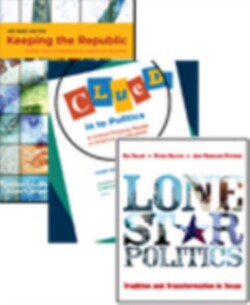Keeping the Republic now with a free supplement analyzing the midterm elections!
Coming in July, this valuable supplement will provide an insider’s guide to the 2010 midterm elections. When placing your order, be sure to use the ISBN on this page to ensure that your students receive the supplement packaged FREE with their textbook.
Keeping the Republic, 3rd Brief Edition
Too often, brief texts sacrifice the flavor of the full edition with an outside author condensing material on the altar of fewer pages. Once examples are cut, what’s left is a drabber book heavy on concepts and devoid of color.
This brief is different. Authors Christine Barbour and Gerald Wright have kept the same strong, cohesive narrative and focus on core concepts that form the basis of Keeping the Republic—and do the streamlining and writing themselves. The themes of power and citizenship so crucial to the full text are found here in abundance, along with an array of engaging stories and cases to keep students reading.
Reflecting changes through the 2008 elections, thorough and extensive updating and analysis of new scholarship are evident in every chapter.
Key features include "What’s at Stake?" chapter-opening vignettes that spotlight the "who, what, and how" of American politics, "Profiles in Citizenship" that inspire students with personal interviews with political luminaries such as Sandra Day O’Connor and Rahm Emmanuel, and "Consider the Source" boxes that help students critically read and digest political information. Other study aids include bolded key terms, chapter summaries, suggested resources, and a glossary.
For more information about Keeping the Republic, click here.
Clued in to Politics
Beyond asking students to analyze a reading, how do you actually get them to do it? With their popular CLUES method, Barbour and Streb train students to Consider the source, Lay out the argument, Uncover the evidence, Evaluate the conclusion, and Sort out the political implications. With their contextual headnotes and CLUES questions, every reading helps develop lasting habits of critical thinking. Around 80 brief selections—36 new to this edition—are drawn from the wide range of media from which students glean political information.
For more information about Clued in to Politics, click here.
Lone Star Politics
Texas is in a bit of a dilemma—it is a rapidly growing state saddled with a constitution that was written by conservative farmers in 1876. Texas’s government struggles to meet the needs of an increasingly diversified population and the challenges of an economy driven by large multi-national corporations, many on the cutting edge of the information age. How has Texas developed and flourished over the years, but failed to fully respond to these changes?
Lone Star Politics explicitly focuses on the disconnect between the outsized myth of Texas with its legendary political history and the reality of the state’s day-to-day governance to help explain who gets what resources and how they are distributed. The engaging and accessible writing style makes this a book that students of all levels will actually want to read. And when they do, they’ll get both description and analysis, a balance of institutions and behavior, as well as comparisons of Texas with other states.
"Texas vs. _______" feature boxes use narrative, tabular data, and critical thinking questions to show how Texas works differently from the rest of the country, while "Texas Legends" boxes show how certain celebrated figures and institutions influence Texans and their identity as well as shape Texas politics today.
For more information about Lone Star Politics, click here.

















